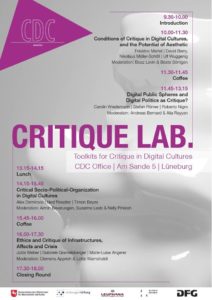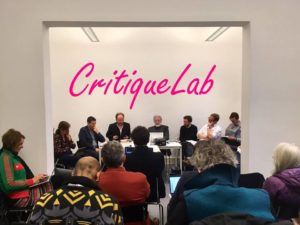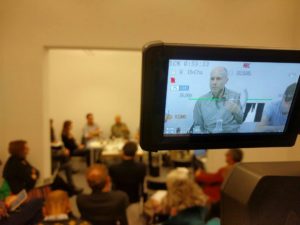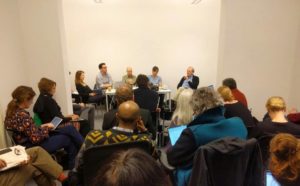Martina Leeker, Mai 2018
Centre for Digital Cultures (CDC), Leuphana University Lüneburg
11. – 12. January 2018
Concept: Martina Leeker
A cooperation between the Centre for Digital Cultures (CDC ), and
The research training group “Cultures of Critique”, funded by the – German Research Foundation (DFG) – Spokesperson Beate Söntgen.


There are 2 task for a “Toolkit of Critique” in this situation. Firstly it is about discussing the state of the art of critique in digital cultures. And secondly we are looking for efficient methods of critique, adapting their conditions.

The focus of the workshop is on the proposal and discussion of concrete methods and practices of critique in digital cultures, imagining a kind of toolkit for critique, depending on the analysis of the conditions of digital cultures. So our workshop is not mainly on a critique of digital cultures, but about the conditions, formats, methods, constraints, hesitations, affordances, possibilities, etc., of critique IN them, or: digital critique, what implies a critical analysis of them.

Opening:
The opening discussion focuses on “Digital Critique or Critique of the Digital?”. The first approach consists of looking for formats of a specific digital critique, which comes out of the technological and epistemological conditions of digital cultures themselves. Second approach is focusing on critique of digital cultures, also questioning, whether and how we can use older theories of critique, like Adorno’s critical theory, or Foucault’s critical genealogy.
With: David Berry and Frédéric Martel Moderation: Roberto Nigro & Martina Leeker
Panels:
Four different topics/panels should compass exemplarily the technological, epistemological, social, political, and economic conditions of digital cultures, framing formats and methods of critique in them.
The panel “Conditions of Critique in Digital Cultures, and the Potential of Aesthetic” discusses critique and methods of critique in digital cultures between critiquing them and digital critique. The potential of aesthetic methods is focused.
With: Frédéric Martel– David Berry – Nikolaus Müller-Schöll – Ulf Wuggenig. Moderation: Boaz Levin, Beate Söntgen
Social media and algorithms create the new public spheres and politics, by – amongst others – fake news, filter bubbles, or new right movements. The panel “Digital Public Spheres and Digital Politics as Critique?” asks for the conditions as well as for methods of critique in these spheres, focusing older practices like solidarity, political disput, or democratic behavior.
With: Carolin Wiedemann – Stefan Römer – Roberto Nigro. Moderation: Andreas Bernard, Alia Rayyan
The panel “Critical Socio-Political-Organization in Digital Cultures” asks for the state of the art of organizing civic society in digital cultures. This concerns the technological conditions and politics of digital labour as well of the organization of institutions.
With: Alex Demirovic – Ned Rossiter – Timon Beyes. Moderation: Armin Beverungen, Lisa Conrad
Digital Cultures make us be-in in smart infrastructures and affective technical environments. Does it helps to go with a new understanding of technology and the human as a symmetrical agency? These are questions for the panel “Ethics and Critique of Infrastructures, Affects and Crisis” Feed these cultures the involvement of human agents as simple giver of data in a global data-driven economy, or could they figure as a guarantee for an ecological ethic of human humility and relational existence?
With: Gabriele Gramelsberger – Marie-Luise Angerer – Jutta Weber. Moderation: Clemens Apprich, Lotte Warnsholdt
- There is for example the situation that critique is distributed between human and technical actors, as Frédéric Martel points out. Critique comes out of combing algorithmically driven judgements and proposition from e.g.: Spotify, Netflix, Amazon, YouTube, or big-data-based digital humanities research with human filtering und judging. With this distribution we loose the concept of an autonomous subject, which was till now – depending on the scientific background – either the fundament, or the product of traditional forms of critique.
- Another aspect of critique in digital cultures is its transformation into hate speech and exchange of blows, undermining the interplay of differentiation, cognitive analysis, discussion, decision making, and problem solving. Critique becomes affect. It has for sure always been affective, but it was not taken as that. Critique-as-affect means losing the reference of debates and becoming an endless loop of self-sufficient arguing.
- One aspect of this development is that it becomes difficult to differentiate positions and camps within the dissolution of small-scale analysis into slogans. If Andrew Culp comes up in “Dark Deleuze” with the slogan that we have to learn to hate and to be negative, it is difficult to distinguish this in the first glance from alt-right positions. Another example is Robert Pfaller’s book “Erwachsenenspiele”, in which he states that the augmentation of vulnerability in contemporary society – as seen in focussing on gender trouble and homophobia – causes the end of solidarity as these aren’t problems of poor people. Does blasting diversity solve the problems of turbo-capitalism and save democratic attitudes?
- This becoming-slogan is accompanied by a kind of hyper-self-reflection in critical theories. This turns them either to a self-referential battle between different approaches. Or they move to a situation of over-enlightenment, knowing their own problematic components and turning and turning around in these.
- Another shift is coming up when we stroll through our social media, surrounded by trolls, bots and fake news. Instead of a critique of “keeping a cool head”, paranoia is taking over. If critique becomes paranoia, the human agents are transformed into hyperactive machines of thinking, re-thinking and re-thinking of the re-thinking. They are very busy and at the same time immobilized.
- Finally we see a trend of turning from critique to discourses of crisis and catastrophes, which are answered by the concept of resilience, instead of problem solving. Resilience means that a system, may it be human or technical, or the whole environment, should adapt to changings in order to survive difficult situations, instead of changing them politically and socially. Critique becomes the management of crisis.
To sum up: As digital cultures are ubiquitous, opaque and immersive, based on non-understanding, secrecy, and unconscious hyper-affective involvement, as well as on a disillusionment of anthropocentric premises, they undermine the prerequisite adopted for critique till now. We are always already in, loosing distance as the decisive condition of critique.
May be that we can be happy with these descriptions. But: there are 2 points to be taken into account. Firstly it is to be said that the correct critique never existed, but only historically changeable forms of it. If it seems for example natural to us that critique needs distanciation, this is a discursive implementation of critique and not its status quo. On the contrary: Critiquing is always affirmative, because we are always involved in it. This leads secondly to the assumption that critique stands for different forms of governmentality, creating ever-changing modes of differentiation, decision making, and subject building, regulating inclusion and exclusion, and installing and controlling resistance against regimes. So we have to take into account that critique is a form of domination. This leads to Foucault’s idea of suspending critique in order to understand the conditions of its judgments. Following this we have to analyze and beat the governmental effects and not critique itself. What kind of regime is established by critique in digital cultures, considering a paranoiac, affective, and resilient subject, practicing critique as a mode to connect people to smart technical environments?
It is this perspective that should help to come to a profound analysis of critique in digital cultures in order to find practices of critique and intervention, which at least are able to reflect on its governmental aspects. The aim is to value, and to change negative aspects of digital critique by finding new forms of critique, or by re-activating and updating older ones. The question is, what comes after: distanciation, recognition, or subjectivity? What could be forms of digital critique, like: playful paranoia, critique coming from the point of being in, using hyper-activity for critique, or changing the fact of being forced to undertake permanent differentiation into distanciation and the power of resistance.
The aim and task of the workshop is to think about and discuss new formats and methods of critique, imagining a kind of very concrete and pragmatic toolkit for critique, in order to overcome a kind of pessimism or helplessness in this new situation of “being-in” and always hyper-connected. If critique in digital cultures has the task to connect people to their technical infrastructures by participation: which kind of critique is needed to subvert this?
A special interest is in art and performance, because they could have a specific role in this. Martin Saar and Judith Butler pointed out that within the art of critique of Michel Foucault as genealogical method of de-constructing knowledge, subjectivity, and regimes, the use of exaggeration and alienation is crucial. To become an alien enables a self-enlightenment of society. Art and performance also bring a negotiation of proximity and distance, involving affects, and emotions and cognitive capacities, which could be a basis and training for subjectivation and individual resistance. This is important as digital cultures take humans agents as statistics, or – as Andreas Bernard points out it in his recent book “Komplizen des Erkennungsdienstes“ – as objects of police recognitions services, what is chosen astonishingly enough voluntarily by ourselves.
